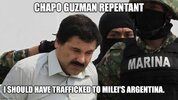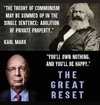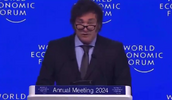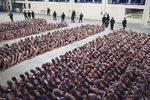The article is from 1 abril, 2017, but I think it makes sense so that those who are not familiar with Peronism can understand it from a Trump / Trumpism point of view.

 cnnespanol.cnn.com
cnnespanol.cnn.com
What do Trump and Peronism have in common?
(CNN Español) -- Clarín correspondent Paula Lugones stopped by our CNN Radio studios in Atlanta to talk about her book Los Estados Unidos de Trump.
Lugones, who was Clarín's International Politics editor for more than 20 years and has covered as a special envoy almost all the primary, legislative and presidential elections in the United States since 1992, talked about what it meant for her to follow Donald Trump's campaign and to travel through the deep America, a United States that she describes as unknown to most Americans and that is part of the so-called Rust Belt, the region in the Middle East of the country characterized by the manufacturing industry.
The deep America that Lugones details represents the majority of Donald Trump voters. Lugones explained that this white voter is frustrated and "angry" that they cannot realize the American dream, blaming the Obama era for creating policies that do not represent them.
That disillusionment felt by the Trump man, Lugones says, also has a lot to do with the advance and use of opioids in the United States.
During the dialogue, Lugones touched on several other topics in addition to the Trump voter profile, which he met in small towns across the country. Lugones talked about the confrontation that President Trump has with some media, arguing that she sees similarities in the way the U.S. government confronts the media with the attacks her newspaper received in Argentina under the government of Cristina Fernández de Kirchner.
The journalist also considers that there are points in common between President Donald Trump and Peronism and brought details about the relationship between the U.S. president and the president of Argentina Mauricio Macri.
The following is part of the interview with Paula Lugones:
When you talk about deep America, do you mean the people who voted for Donald Trump?
The deep America to which I refer is that country that is a little different, far from the coast, where, above all, those of us who do journalism for other countries, suddenly we don't talk too much. It is the inhabitant of the interior of the country: this white, rural man from small cities and not from the big megalopolises (...) I have many experiences of trying to tell a little of what happens in the interior of the country that, given the electoral system of the United States, a voter from Ohio or Colorado is as important or much more important than a voter from New York, and suddenly from the outside this is not very well understood.
Is that the Trump voter you're describing?
It is a much more conservative country, where people do not worry about spending, about going to college. They do not worry as in the coasts: that my son plays the trumpet; that he has good credits; that he takes such a course to enter an expensive and luxurious university, but the worker of these cities of the interior the only thing that looks for is to finish the High School and suddenly to go to work to the factory of the town once he leaves there. His great ambition is to raise a family, have a house, a car and save a little for the future. But that is what has been failing in the last few years and has achieved a frustration in that Trump terrain that drove this phenomenon.
As a Clarín correspondent, you have a critical eye, a different eye than the one that is permanently here. What do you see in Trump's face that we don't see? And what details have you captured in your book?
Donald Trump exerts a fascination around the world. He is a character that of course is known around the world not only for his TV character, but also for his business, for his brand and at the same time, we Argentines, in particular, know him because he has had certain business dealings with the father of the current president Mauricio Macri in the 80s. He is a well-known character. We see him as a very strange phenomenon because we have followed from Argentina, the reports that the American press has been giving about how a character who has never held a public office and who has all those characteristics so far away from a traditional politician in the United States is immersed in a lot of controversy of all kinds, not only financial but also with respect to women, with completely inappropriate comments. In Argentina, there is a great interest in how such a person could reach the White House. In the book, what I try to do is to explain which is the United States that chose this character who breaks all the traditional rules of politics in this country.
I have heard that in Argentina they see Trump (in what is considered here) linked to nationalism. He uses nationalism as a political tool. There have been comments, for example from former Secretary of Commerce Guillermo Moreno, that Trump is a kind of Perón. What is your opinion?
Peronism is a complex phenomenon and quite difficult to understand or explain to the outside world because it cannot be pigeonholed at best ... neither to the left, nor to the right, but it is a great movement that encompasses many aspects. But yes, it is an important aspect of Peronism and in that sense it may have a closeness to Donald Trump.
Peronism is a bit disoriented as to how to position itself in the face of a president like Donald Trump who has many things in common, especially protectionist policies and style, perhaps authoritarian, and there is something that is very, very similar, which is the relationship with the press.
The last Kirchnerist government has had a very similar relationship with the press to the one Trump has at this moment. We have been in the middle of a press conference, journalists from Clarín and other media and we have been accused, we have been kicked out of places. They have told us that we are liars. In other words, we are not too surprised by the insults that the President of the United States is now issuing against the U.S. press.

¿Qué tienen en común Trump y el peronismo? | CNN
Paula Lugones considera que hay puntos en comunes entre presidente Donald Trump y el peronismo y trajo detalles sobre la relación entre el mandatario estadounidense y el presidente de Argentina Mauricio Macri. | Latinoamérica | CNN
What do Trump and Peronism have in common?
(CNN Español) -- Clarín correspondent Paula Lugones stopped by our CNN Radio studios in Atlanta to talk about her book Los Estados Unidos de Trump.
Lugones, who was Clarín's International Politics editor for more than 20 years and has covered as a special envoy almost all the primary, legislative and presidential elections in the United States since 1992, talked about what it meant for her to follow Donald Trump's campaign and to travel through the deep America, a United States that she describes as unknown to most Americans and that is part of the so-called Rust Belt, the region in the Middle East of the country characterized by the manufacturing industry.
The deep America that Lugones details represents the majority of Donald Trump voters. Lugones explained that this white voter is frustrated and "angry" that they cannot realize the American dream, blaming the Obama era for creating policies that do not represent them.
That disillusionment felt by the Trump man, Lugones says, also has a lot to do with the advance and use of opioids in the United States.
During the dialogue, Lugones touched on several other topics in addition to the Trump voter profile, which he met in small towns across the country. Lugones talked about the confrontation that President Trump has with some media, arguing that she sees similarities in the way the U.S. government confronts the media with the attacks her newspaper received in Argentina under the government of Cristina Fernández de Kirchner.
The journalist also considers that there are points in common between President Donald Trump and Peronism and brought details about the relationship between the U.S. president and the president of Argentina Mauricio Macri.
The following is part of the interview with Paula Lugones:
When you talk about deep America, do you mean the people who voted for Donald Trump?
The deep America to which I refer is that country that is a little different, far from the coast, where, above all, those of us who do journalism for other countries, suddenly we don't talk too much. It is the inhabitant of the interior of the country: this white, rural man from small cities and not from the big megalopolises (...) I have many experiences of trying to tell a little of what happens in the interior of the country that, given the electoral system of the United States, a voter from Ohio or Colorado is as important or much more important than a voter from New York, and suddenly from the outside this is not very well understood.
Is that the Trump voter you're describing?
It is a much more conservative country, where people do not worry about spending, about going to college. They do not worry as in the coasts: that my son plays the trumpet; that he has good credits; that he takes such a course to enter an expensive and luxurious university, but the worker of these cities of the interior the only thing that looks for is to finish the High School and suddenly to go to work to the factory of the town once he leaves there. His great ambition is to raise a family, have a house, a car and save a little for the future. But that is what has been failing in the last few years and has achieved a frustration in that Trump terrain that drove this phenomenon.
As a Clarín correspondent, you have a critical eye, a different eye than the one that is permanently here. What do you see in Trump's face that we don't see? And what details have you captured in your book?
Donald Trump exerts a fascination around the world. He is a character that of course is known around the world not only for his TV character, but also for his business, for his brand and at the same time, we Argentines, in particular, know him because he has had certain business dealings with the father of the current president Mauricio Macri in the 80s. He is a well-known character. We see him as a very strange phenomenon because we have followed from Argentina, the reports that the American press has been giving about how a character who has never held a public office and who has all those characteristics so far away from a traditional politician in the United States is immersed in a lot of controversy of all kinds, not only financial but also with respect to women, with completely inappropriate comments. In Argentina, there is a great interest in how such a person could reach the White House. In the book, what I try to do is to explain which is the United States that chose this character who breaks all the traditional rules of politics in this country.
I have heard that in Argentina they see Trump (in what is considered here) linked to nationalism. He uses nationalism as a political tool. There have been comments, for example from former Secretary of Commerce Guillermo Moreno, that Trump is a kind of Perón. What is your opinion?
Peronism is a complex phenomenon and quite difficult to understand or explain to the outside world because it cannot be pigeonholed at best ... neither to the left, nor to the right, but it is a great movement that encompasses many aspects. But yes, it is an important aspect of Peronism and in that sense it may have a closeness to Donald Trump.
Peronism is a bit disoriented as to how to position itself in the face of a president like Donald Trump who has many things in common, especially protectionist policies and style, perhaps authoritarian, and there is something that is very, very similar, which is the relationship with the press.
The last Kirchnerist government has had a very similar relationship with the press to the one Trump has at this moment. We have been in the middle of a press conference, journalists from Clarín and other media and we have been accused, we have been kicked out of places. They have told us that we are liars. In other words, we are not too surprised by the insults that the President of the United States is now issuing against the U.S. press.








